The quiet community of Albion, Corentyne has grown from a few residents to a population of about 10,000 with most of the residents depending on the sugar estate for employment.
When this newspaper visited a week last Friday it was the second day that the field workers had returned to start the new crop following a two-week out-of-crop period.
Some of the other residents are engaged in business while others are teachers or work with public entities. With many persons being out at work and the children at school, the village appeared to be somewhat desolate.

This newspaper caught up with Azir Khan, 55, along the estate road as he was heading to his home at Dr Bush, Albion after work. He has been employed at the estate for the past 33 years and currently serves as a first aider, overseeing a gang of 200 workers.
Khan leaves home at 4.30 am and normally works until 1 pm. Some days he is required to be in the fields until 5 pm and would earn overtime. Trucks provided by the estate transport the workers daily.
Khan said GuySuCo “has a lot of facilities” and mentioned that “at the end of the crop we get one week holiday with pay and after 10 years service we earn an extra week’s pay.”
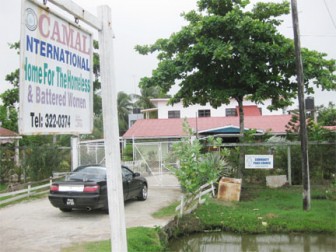
His job is to dress minor wounds that cane harvesters may sustain while using the cutlass. In cases of serious injuries, the estate’s ambulance would be summoned. The injured worker would first be taken to the estate’s dispensary and if necessary to the Port Mourant or New Amsterdam Hospital.
Apart from that, workers and their families are entitled to the free services of the dispensary.
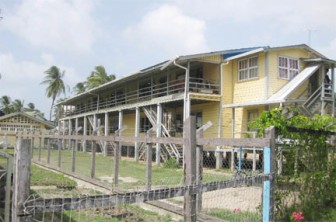
Other residents who are not attached to the estate can also benefit from a limited service at the facility.
They also visit the nearby health centres at Williamsburg about one-and-a-half miles to the east and at Fyrish one- and-three-quarter miles to the west of the village or else go to the hospitals. Both health centres are staffed with a midwife and medex.
During the out-of-crop season, workers would be engaged in fishing, gardening or doing odd jobs.
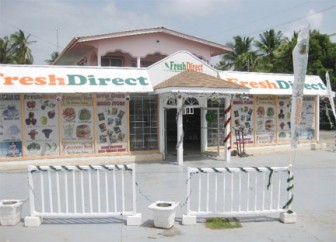
Katenarine Ramotar, 49, also of Dr Bush works in the field to “draw plant.” He had not turned out to work that day and was instead, at home making cast-nets. He would either sell the nets or use them for fishing himself.
His 20-year-old son, Vicky, a cane harvester at the estate, said he enjoys fishing and would do so with his cast-net in the nearby trenches. He takes the fish home to cook but when he has a lot “we can’t use all so I would sell the rest.”
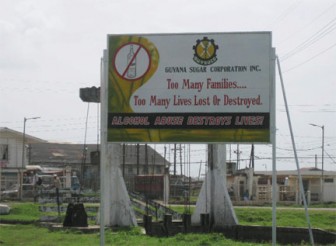
Along the street at Dr Bush, a young man was reaping bora and celery from a farm where a greenhouse has been established. The farm is owned by his father, Ram, who had gone to the city at the time to conduct business.
Residents described the village as “quiet” even though at times some of the youths would be involved in “using drugs and a lot of alcohol.”
The village has a few snackettes, grocery shops, boutiques, a hairdressing salon and several rum shops.
The owner of one of the snackettes, ‘Fresh Direct,’ who gave her name as ‘Baba’ said she and her husband opened the business three years ago. She sells items like ice cream, sodas, salted and sweet snacks as well as food items. The woman said the name ‘Fresh Direct’ was chosen because she wanted to ensure that everything served there was “fresh.”
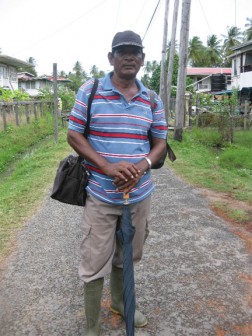
She has a generator in case of a blackout and even has an ice factory to supply ice for her business.
Alcohol consumption
Although persons are engaged in profitable businesses residents observed that the rum shops would be “sold out” especially on weekends. They said too that the biggest supporters of these liquor restaurants are the labourers from the sugar estate. Their habit, according to a resident, would lead to domestic disputes.
“Some of the men would beat their wives and chase them out and would even curse the neighbours…” the resident said.
Not only would the alcohol consumption cause problems in the home but according to the resident “sometimes they would drink for days and they cannot go out to work or they can’t perform on the job.”
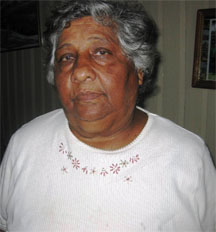
This was evident from a ‘no alcohol’ sign posted outside the Albion Estate (as well as all the other estates) which reads: “Too Many Families… Too Many Lives are Lost or Destroyed. Alcohol Abuse Destroys Lives.”
Albion Community Development Centre
Some of the youths in the village are engaged in sports like cricket and volleyball at the Albion Community Development Centre (ACDC) that is managed and maintained by GuySuCo. They first have to be registered with the club before attending practice sessions in the afternoons and taking part in matches.
General Manager (GM) of the Albion Estate, Yudhisthiram Mana told the Sunday Stabroek that a Community Development Officer is in charge of the affairs of the centre, while a caretaker has the responsibility of preparing the ground for matches.
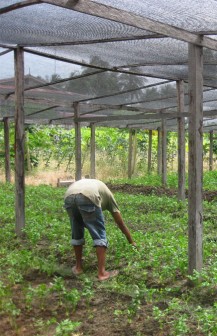
Mana who has to give permission for the use of the ground said it needs refurbishing and that the work is expected to start soon. He pointed out that the estate is “only confining the ground to
sports” and that cultural activities like the chutney shows, Berbice Expo & Trade Fair and Arrival Day celebrations are no longer held at that venue.
“The ground used to be damaged during those activities so we took a decision not to have them there any more.” However, organizers can use the other grounds belonging to GuySuCo at Rose Hall, Canje and at Port Mourant.
A computer centre was recently commissioned at the ACDC for workers and their families and Mana said it is attracting a lot of responses. The first batch of students will graduate next month and students are being recruited for the new course that would begin in March.
With regard to the operations of the estate, Mana said the burning of the cane started on Thursday January 13, harvesting was done the following day and on Saturday the “crushing” commenced.
The last crop began in July and although the out-of-crop period lasted for just two weeks the workers were on strike for increased wages four weeks prior to that. Mana stated that the poor turnout had severely affected production with the estate losing 91,000 tonnes of cane. It is projecting a target of 31,000 tonnes of cane for the first half of this crop. The GM is confident that it can be achieved providing “the weather gives us a break.” He stressed too that “it is important for persons to come out to work because if they don’t then we wouldn’t be able to produce.”
The estate employs a total of 3,400 workers from No. 19 Village to Adventure on the Corentyne.
A police station is located in the village and the building houses the magistrate’s court where sessions are held on Tuesdays and Thursdays.
Camal’s home
Like many other villages on the Corentyne and West Berbice, Albion has its fair share of other social problems including incest. It was for that reason that the Camal’s Inter-national Home for Homeless & Battered Women was established.
Founder/President of the Home, Carmen Kissoon, told the Sunday Stabroek that she “saw the need to have the home for the children and I also wanted a safe haven for battered women.”
The home currently has 41 children from whose ages range from four to 17, as well as a 22-year-old woman who “thinks like a six-year-old.”
Kissoon, a re-migrant who served as a social worker at a rehab centre in Canada for over 20 years returned to Guyana in 1991. She was then trained as a counsellor with the Help & Shelter Organization.
The orphanage was opened in 1996 and she related proudly that “from then to now I helped to save a lot of lives. Before they came here some persons wanted to end their lives because they had nowhere to run and no one to turn to.”
Kissoon provides temporary accommodation for the women and ensures that they get medical attention in case they received injuries. The police would also be informed and the perpetrators would be arrested. But sadly, many of the women go to the court and “beg” for their partners to be spared and end up in the abusive situations again. Some of the women have chosen to move on with their lives though.
Two of the incest victims who were taken to the home were pregnant. One of the girls delivered her baby prematurely in the bathroom, and the baby did not survive. The other girl gave birth at the hospital and her baby was immediately given up for adoption.
Kissoon, who is fondly referred to as “grandma” by the children said she even held weddings at the home for some of the older girls and she has “grandchildren.” From time to time they would “come and visit us.”
She stated that the orphanage is not “religious-based. The children are free to practise their own religions and persons would come in to teach them. We are more concerned about their moral standards – that’s important – and their education.”
Some of the children attend the Cropper Primary school in the village and would walk the short distance to get there. A few of the older children who attend secondary schools a couple of miles away would use their bicycles to go.
Kissoon along with her (biological) children who reside in Canada sustain the home financially. This is also done with support from local and overseas-based residents who would provide meals for the children. “The days when nobody brings food we would have to cook,” she said.
But even then she gets assistance from businesspersons.
She expressed gratitude to the owners of businesses including Afzal Haniff & Sons Rice Mill, Spready’s Bakery for providing bread every day and D Arjune & Sons for providing chicken on a weekly basis.
Seerinauth Harilal
In another section of the village, Seerinauth Harilal, 65 was relaxing in his hammock when this newspaper dropped in, and was willing to share stories about the village.
Harilal who said he “born and grow in this village” recalled that as a child the villagers were more “united. In those days residents were very poor; everyone used to cook on firesides.
But the people were not lazy; every yard had a kitchen garden.”
“Now,” he said “you find that they depending on relatives to send money, clothing and so from overseas. Even the youths after finishing school would just find time to waste rather than doing something constructive.”
Albion, a predominantly Hindu community, according to Harilal, has four mandirs, one mosque and two Christian churches. While most of the residents “still upkeep their religion the moral standards of some people have dropped.”
He pointed out that Albion was a big village but has been divided into about 15 smaller villages including Hampshire, Nigg, Chesney, Belvedere, Sand Reef, Dr Bush, Guava Bush and Topoo.
Residents used to live in “logies with their families until the estate gave them portions of land to build houses from the backlands to the front lands.” During that time they continued working at the estate and “if qualified, they earned a piece of land measuring 3 rods by 75 rods to plant rice.”
Harilal recalled that the village had a paddy nursery and whenever it rained “water would get into the nursery.” He and the other children had the task of bailing the water out before going to school.
In the afternoons after school and on weekends they would also have to go to the field and assist parents with the farming. “We would have to root the young rice plants from the nursery and replant in the fields.” He also remembered that after reaping the rice the cows had to be used to plough the fields. After that he helped to level the land with the hoe and then planted the field again.
The Cropper Primary School which was run by the Christians was named after J B Cropper, the Superintendant of the Canadian Presbyterian Mission, who believed in setting up schools for the Indian population. The government took over the school in the 1960s.
After sitting the National Grade Six Assessment examination the students move on to secondary schools at Rose Hall, Port Mourant and New Amsterdam.




